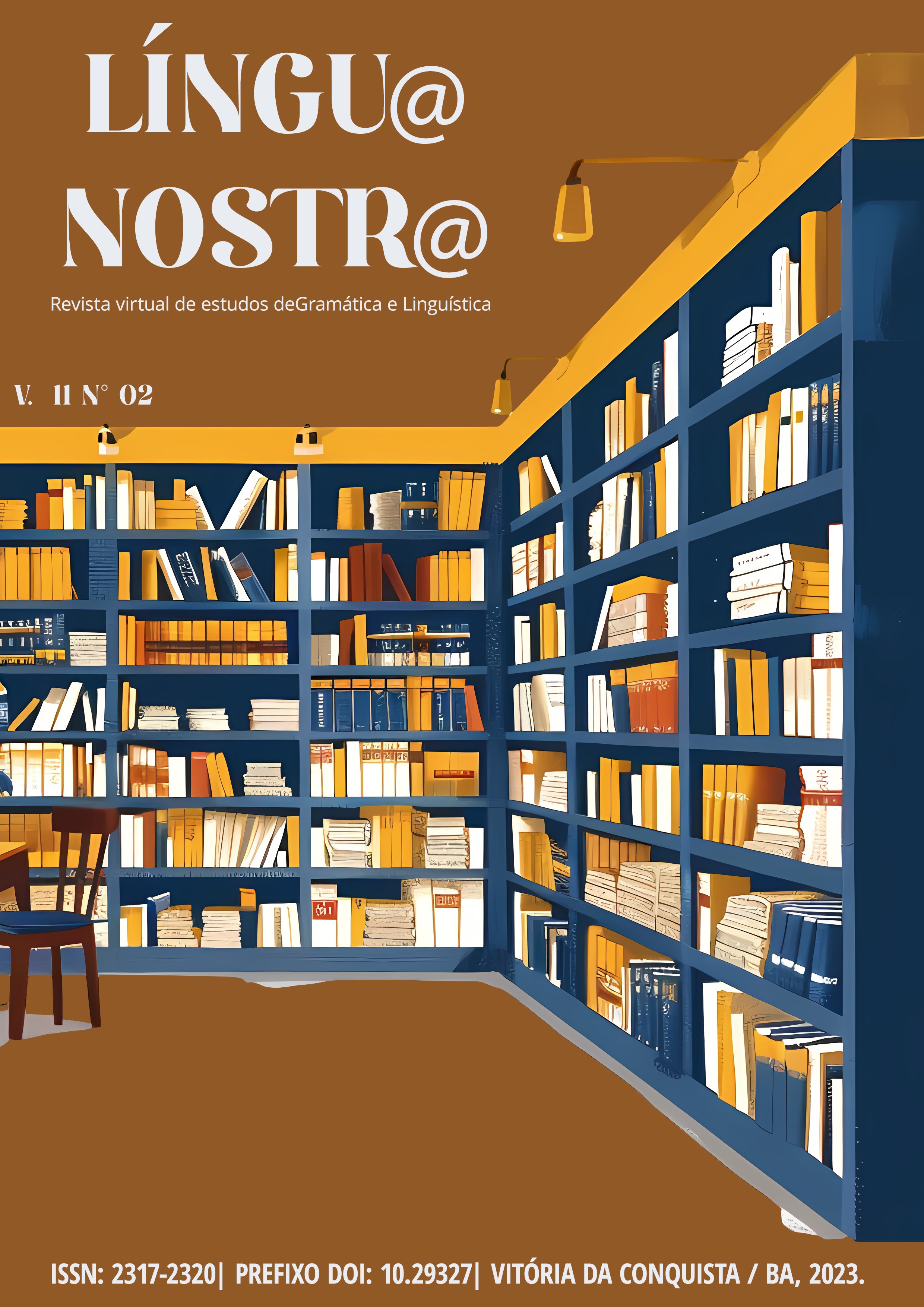Meu texto, minhas regras: o apagamento do pronome oblíquo na produção escrita do 8° ano
DOI:
https://doi.org/10.22481/lnostra.v11i2.13842Keywords:
Apagamento Pronominal, Sociolinguística, Produção EscritaAbstract
This article aims to reflect on the deletion of unstressed oblique pronouns in texts produced by students of the 8th grade of Elementary School in two public schools in Goiás. It starts with the questioning that problematizes whether the deletion of the oblique pronoun in the written production of these students comes from an interference of speech. This marks a biased variant, possibly due to the presence of other pronouns that attest to the interference of speech in writing. In the Goiás dialect, some oblique pronouns have lost their reflexivity or other syntactic functions, mainly in the spontaneous everyday speeches that are inscribed in the production of written texts. The complexity of its placement and/or its erasure requires looking at the production of the text as a materiality of meanings that summons, beyond language, the social and territorial place of the subject who enunciates and who is inscribed in his text. The postulate of variationist Sociolinguistics guides the discussions held here, as well as different authors who dialogue with language and Portuguese language studies. In the analysis carried out, the empirical and documental method is considered, whose cut requires the analyst's interpretation of the relationship between linguistic knowledge, language and its everyday uses. Although rule-driven, these uses are always subject to interpretation. Thus, the observations made on the data, specifically made up of extracts extracted from 05 (five) texts randomly chosen among 50 (fifty) texts collected, led to hypotheses that may explain the deletion of oblique pronouns regarding the different functions they play in the uses of the spoken and written language presented in the texts. This work represents, therefore, an attempt to study the erasure of oblique pronouns in the discursive process that, in part, affects their movement of meaning.
Downloads
References
ALENCASTRE, José Martins. Estudos Historicos: Annaes da Provincia de Goyaz. Revista Trimestral do Instituto Historico, Geographico, e Ethnographico do Brasil. Tomo XXVII, Parte Segunda. Rio de Janeiro: B. L. Garnier Livreiro Editor, 1864.
ALKMIM, Tânia M. Sociolinguística. In: MUSSALIM, F.; BENTES, A. C. (Org.). Introdução à linguística: domínios e fronteiras. V. 1. 5. ed. São Paulo: Cortez, 2001.
ALMEIDA, Milton José de. Ensinar português? In: GERALDI, J. W. (Org.). O Texto na sala de aula. 3. ed. São Paulo: Ática, 2005.
BAGNO, Marcos. Preconceito linguístico: como é, como se faz. 45. ed. São Paulo: Edições Loyola, 2004.
BASSO, Renato M.; GONÇALVES, Rodrigo T. História concisa da língua portuguesa. Petrópolis, RJ: Vozes, 2014.
BENVENISTE, Émile. Da subjetividade na linguagem. In: Benveniste, É. Problemas de linguística geral I. Tradução de Maria da Glória Novak e Maria Luísa Neri. 4. ed. Campinas, SP: Pontes, 1995.
BRASIL. Base Nacional Comum Curricular. Brasília: MEC/CONSED/UNDIME, 2018. Disponível em: http://basenacionalcomum.mec.gov.br/images/BNCC_publicacao.pdf.
BRIGHT, Willian. Sociolinguistics. La Haye: Mouton, 1966.
FARACO, Carlos A. Por uma pedagogia da variação linguística. In: CORREIA, D. A. (Org.). A relevância social da linguística. São Paulo: Parábola Editorial: Ponta Grossa, PR: UEPG, 2007.
FARACO, Carlos A.; MOURA, F. M. Língua e literatura. São Paulo: Editora Ática, 1996.
GERALDI, João W. (Org.). O Texto na sala de aula. 3. ed. São Paulo: Ática, 2005.
MESQUITA, Roberto M. Gramática da língua portuguesa. 9. ed. São Paulo: Saraiva, 2007.
NOLL, Volker. O português brasileiro: formação e contrastes. São Paulo: Globo, 2008.
PÊCHEUX, Michel. Semântica e discurso: uma crítica à afirmação do óbvio. 3. ed. Tradução de Eni P. Orlandi [et al.]. Campinas, SP: Editora da Unicamp, 1997.
POSSENTI, Sírio. Gramática e política. In: Geraldi, J. W. (Org.). O Texto na sala de aula. 3. ed. São Paulo: Ática, 2005.
SAUSSURE, Ferdinand de. Curso de linguística geral. Tradução de Antônio Chelini, José P. Paes, Izidoro Blikstein. 27. ed. São Paulo: Cultrix, 2006.
SCHERRE, Marta M. P. Variação linguística, mídia e preconceito linguístico. In: SCHERRE, Marta. Doa-se lindos filhotes de poodle. São Paulo: Parábola, 2005.
SOARES, Magda. As muitas facetas da alfabetização. Cadernos de Pesquisa, São Paulo, n. 52, p. 19-24, fev. 1985.
SOARES, Magda. Diferença não é deficiência. In: Soares, Magda. Linguagem e escola: uma perspectiva social. 17. ed. São Paulo: Ática, 2000.
Downloads
Published
How to Cite
Issue
Section
License
Copyright (c) 2024 Língu@ Nostr@

This work is licensed under a Creative Commons Attribution 4.0 International License.






